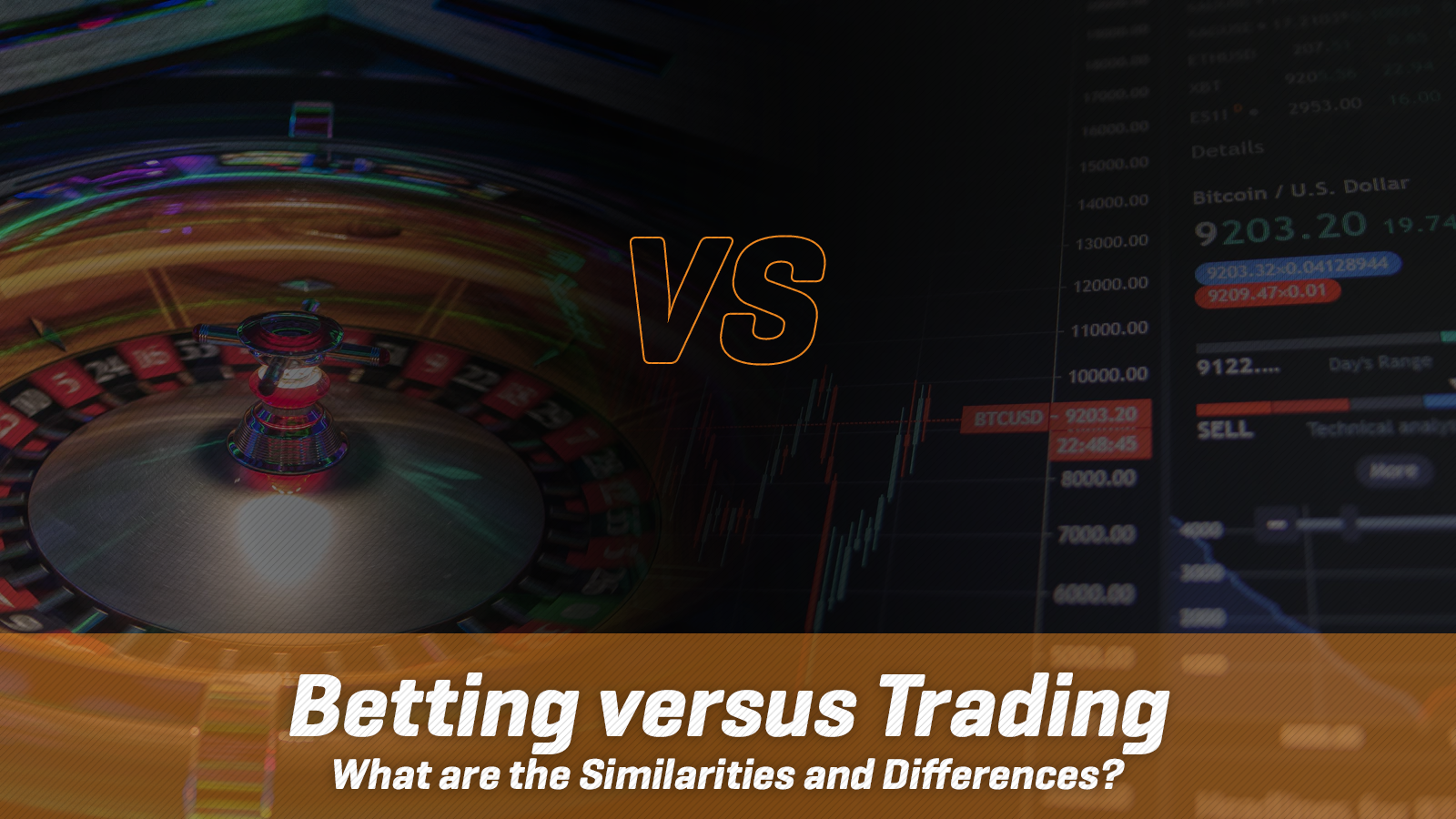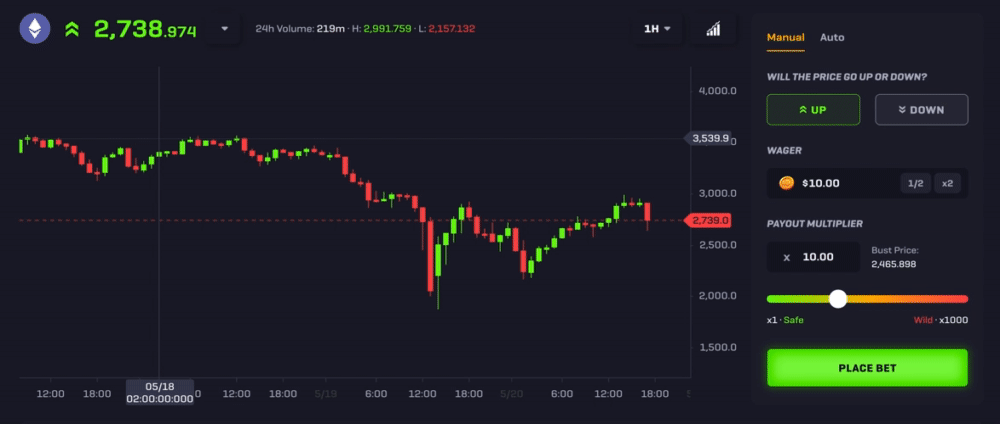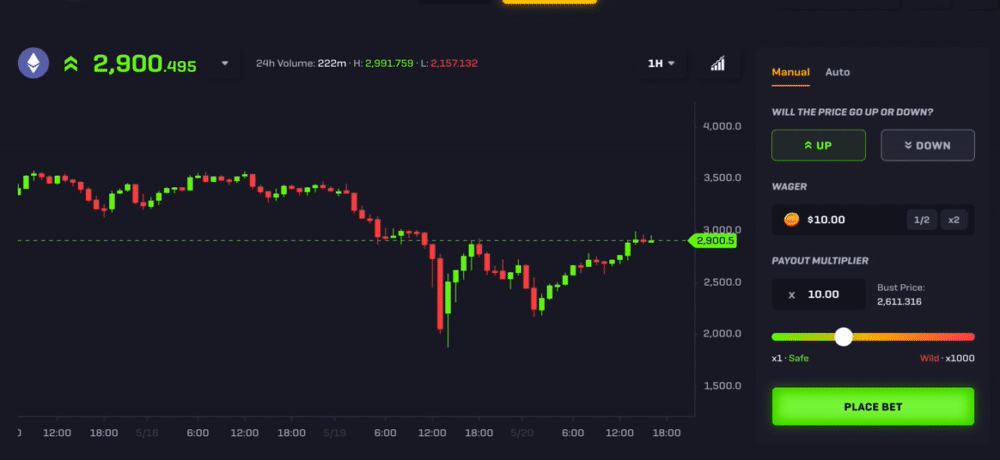Betting versus Trading: What are the Similarities and Differences?
Is trading really the same as betting?

There’s a subtle difference between investing, trading and gambling.
Many people conflate betting with trading. Although there are similarities between the two, there are also some important differences which we’ll highlight in this article. First, let's look at what investing is, how that differs from trading and then finally compare betting versus trading.
What is Investing?
Investing involves putting money into a project with expectations of making a profit over the long term. Investors have full ownership of an asset (like cryptocurrencies, gold or real estate), generating an income from an appreciating price or by receiving cash flows associated with the asset.
Skilled investors seek opportunities to buy something that is undervalued, do their homework, and are patient, waiting enough time until it becomes more valuable in the distant future. Smart investors also take custody of the asset, whether it is a property, bar of gold or a cryptocurrency.
Investors are also much more likely to focus on a certain philosophy, usually seeking opportunities they think will change the world in a positive way. For instance, many of the earliest crypto investors identified the value of bitcoin way earlier than others. They correctly predicted that the cryptocurrency would achieve critical mass, become demanded enough as a medium of exchange and as a digital store of value to push the price to greater highs over the years. Even after all these, many people compare investing in cryptocurrency now as like investing in internet companies in the late 1990s.
Investors favour the use of fundamental analysis, which is assessing the long-term drivers of the price and underlying value of an asset. For cryptocurrencies, this can include a wide range of factors including, but not limited to:
- the number of active addresses/token holders, the number of transactions and the total dollar value of all transactions (which all indicate the usage of a cryptocurrency),
- the evolution of the hash rate for a Proof-of-Work cryptocurrency, plus how it's distributed (as a measure of security), and
- Development activity related to cryptocurrency's underlying code (a proxy for innovation potential).
Investors are only concerned with the long term (think 5 years and more), whereas traders are much more focused on the medium- and short-term price movements - although some traders that keep positions open for weeks or months at a time are like a combination between the two.
What is Trading?
Trading involves being a lot more active and assessing the market on a more frequent basis. They're aiming to apply a systematic and methodical approach to become consistently profitable trading the market's movements on a minute-by-minute, hourly, or daily basis.
You may have heard the term 'day trader', referring to those who take many trades throughout any given day and typically holding onto these positions for only 12 hours or less.
Another category is the 'swing trader', typically taking fewer trades and holding onto them for up to a few days at a time. On the opposite end of the spectrum are 'scalpers'. They execute a large number of trades in a day to ride smaller price movements for a much shorter duration - an hour, 30 minutes or even 30 seconds!
The aim of trading should be to at least preserve the value of your capital, and as you gain more experience, become profitable over time. With common sense, an understanding of the market and seeing trading as a game of probabilities, it’s possible to achieve profitability over the long term.
How Does Trading Compare to Investing?
Since traders are more active and make more decisions on a daily basis, it’s important to remove any emotion from the equation. If you invest in something for the long-term, it’s easier to remove yourself from any emotion since if you've done your research. You’ll know why you invested and what you expect to happen in the future to either validate or invalidate your idea. Until it's clear that your idea has failed, you’d hold on to your investment.
But with trading, you are more sensitive to price movements since the situation can change rapidly and often traders use leverage to amplify their profits. However, leveraged trading is a double-edged sword, since your losses are also amplified if your trade doesn’t work out.
And here lies a major difference between investing and trading: with leveraged trading, you can lose your entire wager if the price moves far enough against you. If the leverage used is higher, the price movement that causes you to lose your entire wager is smaller. The lower leverage used, the less likely you'll lose your initial investment.
Although trading can generate profits quickly from smaller price movements as compared to investing, there are more calculations involved. You have to predict how far the price might move in either direction, as well as assess the probabilities. You also have to calculate how much risk you want to take on. It’s advised to risk only a small percentage of your total bankroll (e.g., 1% to 5% of your total balance), use lower levels of leverage to avoid major losses, and to cut losses before they eat into your capital.
When trading on Rollbit you should make it a habit to use of the take profit/stop loss feature, which allows you to place an order to buy or sell at a specified price to lock in your profits using a take profit order, or to limit your loss with a stop loss order:

How is Trading Different to Betting?
Betting is defined as the act of wagering money on an outcome that has a negative expected value over the long term, meaning you are expected to lose a certain amount of money (say $5) for every $100 you play with. Of course, some people win big on bets occasionally, but if you were to bet consistently over a certain period of time, then the odds are stacked against you and you'll encounter losses.
In contrast to trading, luck is the single deciding factor in betting. Whilst luck plays a part in almost everything in life, betting on the outcome of a random event is hoping that your hunch or instinct will prove right and that you will win large profits. While luck is a factor in trading, experience and skill can take more importance.
The price of a cryptocurrency (or any other financial asset) is driven by various factors, so there’s no concept of house edge or Return To Player (RTP) percentage. While it’s still important to have a probabilistic mindset and manage your risks in both betting and trading, the likelihoods you have to consider for the latter are more complex. Another major difference between the two is that a positive expected return over time is possible with trading, but this is not true for betting.
Some casino games require skill (such as Poker), but even if you are playing properly, there’s still a negative expected return for each player. The expected loss a player faces over time is equal to the house edge and is expressed in percentage terms. You're playing against the casino when you’re betting, whereas with trading you are playing against all other traders, which includes a much wider and varied set of participants.
Developing an edge or strategy is an important part of trading. It’s all about understanding each particular market you trade, understanding the psychology (since the market's movements can be attributed to the collective psychology of all participants) and how the price has behaved in the past, then working with that to determine how the price might behave in the future.
Developing a Trading System
Before you put any significant amount of money on the line, it’s recommended to perfect a trading system that can be tested and can br proven to be consistently profitable. Of course, there will be some trial and error and improvements to be made along the way as you gain experience. There’s no substitute for examining and studying the markets in real time, observing the price action. Think of it as the pulse of that market at any given time.
Once you’ve familiarised yourself with how the price has behaved in the past and the dynamics in real-time, you can begin to develop some strategies - which could be based on technical analysis, fundamental analysis or sentiment analysis (or even a combination of any of the three):
- Technical analysis: a good example of technical analysis is evaluating the current price against the 20-, 50-, 100- and 200-day moving averages. The moving averages give an indication of the current trend, and when or at which price zone the current trend may change. Typically, traders look to buy an asset when the price has closed above an important moving average (e.g., 200-day) after trading below it.
- Fundamental analysis: is important for both investing and trading, since the factors examined here are related to the long-term growth of a cryptocurrency. If you want to trade over the span of weeks or months, then being in tune with the fundamentals driving that market will be a key focus point for you.
- Sentiment analysis: relates to the psychology of the market, what themes are impacting the prices in the short run, and social media activity. A recent example is the influence of Elon Musk on cryptocurrency markets through his Twitter account. In the past few months, various statements have evoked reactions from the prices of bitcoin, dogecoin and other major cryptocurrencies as Tesla went from accepting bitcoin to denouncing it over environmental concerns a while later, weighing on the entire cryptocurrency market.
Subscribe to our blog to learn more about the different analyses used by cryptocurrency traders in upcoming articles!
For shorter-term trades, technicals and the market sentiment are much more influential than the fundamentals. In contrast to investing in cryptocurrencies, trading requires quick reactions to the markets and the monitoring of price, volume, addresses or transactions on publicly available blockchains, social media, global news and so on.
You can access technical indicators for the cryptocurrencies available on Rollbit from the trading chart by clicking on ‘Advanced Mode’:

With trading, in contrast to betting, it is possible to develop a set of rules to make sure you have a positive expected return over time. After developing a set of strategies, it’s important to be disciplined, to cut any losses while also letting your winners run. Stick to your plan and your rules so that when your idea turns out to be wrong, you can limit your losses, while also exiting a profitable trade at the right time.
Another important difference with trading is that Rollbit is not guaranteed to make a fixed percentage of all bets placed over the long run (as with our casino games). Instead, all trades opened by our users are hedged and the only fee that Rollbit earns is a small percentage charged to profitable traders. If you close a losing trade on the trading platform, no revenue or profits accrue to Rollbit - since there are no fees to open or close trades.
When is Trading Considered Gambling?
There are many similarities between trading and gambling: there’s a risk you will lose money in both cases, and you also decide for yourself how much money to put at stake. Being mindful and calculating with how much you put at stake is likely to determine your success in betting, investing and trading.
Another thing in common between betting and trading is that the outcome you experience can change in a split second, sometimes causing large losses in a short amount of time. The reverse is also true, you can win big in a very short amount of time. Again, that’s why it’s important to have a plan. If you stick to it, you are less likely to end up wasting away big wins or continuing to trade in the face of big losses.
Despite these similarities, it’s a common misconception to consider trading as gambling. Usually, bad trading practises or habits lead people to gamble on cryptocurrencies, stocks and other financial markets. There are a few things to consider when determining whether you are gambling or trading:
- Are you getting involved in trading only to win?: Traders with a 'must-win' attitude will be humbled by the market. They often fail to recognize a losing trade and exit their positions. Instead of focusing on profits or how much you’ll make, you’ll be better off perfecting a trading system that is consistently profitable and trading those strategies. Of course, this will involved some trial and error. And as you gain experience, it's likely your strategies will go through several iterations to achieve the best results. Traders may have a reputation for playing hard, but they also have to work hard to find profitable opportunities.
- Are you trading without knowledge about the asset or risk management?: Trading does not differ from betting if you have no knowledge about the asset you're trading and no risk management in place. As mentioned above, every trades cannot be a winner. The key is be prepared for any eventuality and manage your risk so even if your win rate is less than 50%, you can still be profitable by following a plan.
- Do you have a trading plan? Are you going against your trading system or plan and breaking the set of rules you've developed for yourself?: For example, entering or exiting a trade without any good reason according to your setup. A trading plan helps to inform you on when to enter a trade, when not to enter trade, as well as eliminating bad ideas and keeping hold of good ones. Plan your trade, then trade your plan.
- Are you trading based on emotion?: The main emotions that can cause traders to make mistakes or to gamble are fear and greed. Some examples are: i) exiting a trade out of fear after a rapid movement in the price, or ii) because of greed, you hold onto a winning trade too long and watch the unrealised profits evaporate as the price reverses.
Bet (and Trade) for Fun
To conclude, there are some important differences between betting and trading. The former should be viewed as an entertainment activity, where you can decide how much you’re going to play with and any wins are bonuses on top of the entertainment factor.
You should also have fun when trading (and not be nervous or stressed), since the more you enjoy it the more likely you are going to be profitable. However, unlike betting, making money consistently from trading relies on building your knowledge about those markets, developing a systematic way to trade and developing a set of skills such as: trading theory & practice, economics (auction theory), research, programming, statistics and so on. These skills can be honed over time to give you an ‘edge’.
It’s possible to develop a system to ensure you have a positive expected return over time and some individuals have been able to generate an income comparable to full-time employment. But not everyone is cut out for trading. It takes a certain attitude and skill set to succeed. Getting to a point where you're consistently profitable over time is likely to be a long and difficult journey.
But many individuals have achieved it through determination, mastering particular techniques that have been proven to work over time, as well as adapting and learning new concepts to adjust to changing market conditions. Many people gamble when trading because they don't understand the market, or why price moves, or how to manage risks - without any guide, you're bound to get lost!
Subscribe to our blog, join our Discord or follow us on Twitter to get notified when we publish articles about cryptocurrency and trading!-The Rollbit Team